
Warhammer 40K: Rogue Trader Review
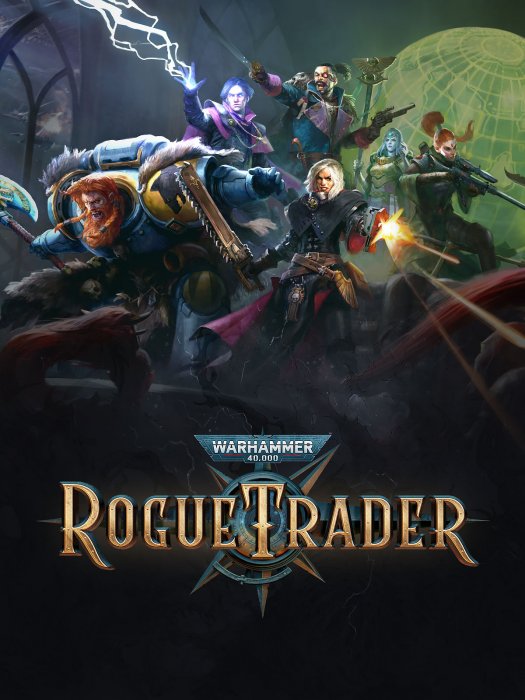
Pros
- Shades of gray choices and grimdark power fantasy
- Excellent use of the Warhammer 40,000 setting
- Good story and characters
- Scratches that 'space exploration' itch
- Robust character customization
- Hassle-free inventory management
Cons
- Combat can be slow and tedious at times
- Needlessly complex talents with many dud choices
- Ship combat is brutal at first
- Numerous bugs and glitches
Since the launch of their first game, Pathfinder: Kingmaker, Owlcat Games has earned a reputation for crafting old school CRPGs with robust narratives. And so, when Warhammer 40,000: Rogue Trader was first announced, the combination of an Owlcat-developed RPG set in Games Workshop’s ever-popular universe drew attention from both fanbases.
While Warhammer 40,000 isn’t untrodden territory in gaming, most releases to date have focused more on promoting the more iconic aspects of the grimdark universe, as opposed to offering a strong, more nuanced narrative… and some of the darkest corners of the Warhammer 40,000 universe are yet to be fully explored.
To address the elephant in the room, you do not need to be familiar with Warhammer 40,000 lore to play Rogue Trader, but you’ll definitely enjoy the experience more if you are. Rogue Trader features an index (the “Corpus Valancius”) packed with lore, world concepts, and other terms you’ll want to become familiar with, and many keywords are highlighted during conversation, so you need only hover your cursor over an unfamiliar word to gain enlightenment. That said, this codex is, in Warhammer 40,000 tradition, not unbiased, providing lore specifically from the perspective of the Imperium of Mankind.
As the saying goes, “Everything is canon, not everything is true”, and only by immersing yourself in the broader lore of Warhammer 40,000 will you more fully understand (most of) the world’s events. Owlcat Games manages to tread the line between being impenetrably obtuse and reasonably accommodating to newcomers, all without turning every single encounter into the exposition dump that would be necessary to inform the uninitiated.
Plot a path among the warring factions of 40K
Rogue Trader is set in the Koronus Expanse, an isolated pocket of the galaxy whose seclusion has prevented its complete subjugation by larger powers. Untamed and only partly civilized, the Koronus Expanse is the perfect venue for exploration and adventure, where an aspiring “Rogue Trader” might, in the absence of more powerful Warhammer 40,000 factions, carve out their own interstellar fiefdom. That is, if they can manage to survive the endless throngs of conspiring rivals, pirates, mutants, xenos and other dark forces that infest every corner of the galaxy.
This sense of seclusion and isolation also gives the narrative some breathing room, allowing a more personal story to take place away from the tall shadows cast by the iconic power-armored demigods who otherwise threaten to draw all narrative attention to themselves.
Players begin Rogue Trader by creating their own character, complete with a choice of homeworld, origin, and archetype (or class), which will define some of their initial talents and skills. The archetypes on offer include ranged specialists (Soldiers), more melee-focused front-liners (Warriors), as well as dedicated buffers (Officers), and debuffers (Operatives). After sufficiently leveling, you’ll be able to select a second, more advanced archetype to progress in, eventually synergizing these two archetypes as you advance as an Exemplar.
Regarding character origins, the Death World homeworlders gets a nice bonus to critical hit chance, while the Ministorium Priests possess solid ways to boost their Resolve (leading to faster and more frequent use of ultimate abilities). But by far the most interesting origin is the Sanctioned Psyker, who have access to a whole subset of Psyker abilities and talents, regardless of what archetype you later choose. All of your companions, be they salty old Imperial Navy officers, tech-priests of the Adeptus Mechanicus, skulking unsanctioned psykers, or the fiery-eyed “nuns with guns” of the Adepta Sororitas all make use of these same general origins and archetypes, albeit with bonus talents that help set them apart from your protagonist and whatever mercenaries you hire. This time around your companions are competent enough that, save for the most ardent of min-maxers, there’s no great compulsion to replace them with hirelings, which sacrifice personality in exchange for full customization.
You’ll establish your authority as a Rogue Trader - resolving a variety of problems that offer ample opportunity to shape what kind of Lord Captain you wish to be.
Whatever role you choose, you begin the game as a prospective yet unsuspecting heir to one of the more powerful dynasties in the Koronus Expanse, that of House Von Valancius. In typical Owlcat fashion, the prologue covers your unexpected ascent to power and the betrayal that pushes the plot forward, with new gameplay elements introduced fairly regularly and at a brisk pace over the game’s first two chapters. During this time, you’ll establish your authority as a Rogue Trader - resolving a variety of problems that offer ample opportunity to shape what kind of Lord Captain you wish to be. More importantly, you’ll gain control of your own Voidship, a massive space-faring vessel with thousands of crew and impressive firepower - your own prowling fortress and headquarters.
Many games in this genre - including Owlcat’s previous releases - have some sort of alignment/morality system, and a similar system can be found in Rogue Trader, with the standard “good/evil” and “chaotic/lawful” grid being replaced by three convictions based on how your actions relate to the Imperial Creed. Either you’re Dogmatic (you adhere to the Imperial Creed and the God Emperor), Iconoclast (allowing considerations like humanity to get in the way of an otherwise hard line dogma) or Heretic (acting against the Imperial Creed and almost by definition embracing Chaos). One of the more liberating aspects of a title such as Rogue Trader is that there aren’t really any “good guys”. Morality is relative.
The Iconoclast might only be “good” compared to the other two options, with Dogmatic characters being tempted to execute anybody who fails to live up to the impossible standards of the Imperium and Heretics being rather prone to consort with demons and spread Eldritch horrors in their wake. While the conviction system is interesting enough in its own right, it does take a while before some of your choices start to matter. Heretical characters don’t really start to diverge too much from the Emperor’s faithful until the end of Chapter Two, and some choices have surprisingly little consequence to them - you’d think ordering an exterminatus on a planet overrun by Chaos would have more impact than counter-praying against a Chaos Space Marine, but you’d be wrong. Performing actions of a certain conviction (these are usually - but not always - marked in dialog) will get you points towards said conviction, and you’ll get various bonuses as you achieve various ranks in your conviction, so you’ve got some incentive to pick a conviction and stick to it - although restraint is sometimes a better long term strategy, especially for Dogmatic characters - the game has a nasty habit of allowing you to execute companions for a trivial gain to your Dogmatic conviction
Even when these convictions aren’t in play, the game’s shades of gray narrative remains interesting. You’re given a great deal of power and authority from the start of the game and there’s very little oversight and accountability for your actions, at least at first. Whether you petulantly make your seneschal announce you to those of lower status (which is virtually everybody in the Koronus Expanse), flog your crew in the name of discipline, deploy squads on suicide missions in search of plunder or wantonly purge your own crew in response to some warp accident that you, as the ship’s Lord Captain, were probably responsible for in the first place, you’re put in an interesting position in Rogue Trader and aren’t stuck making binary choices. The fact that you’re rarely punished for what would generally be considered immorality of the highest order is liberating, while also keeping true to the grimdark setting of Warhammer 40,000. You’re a feudal overlord and your crew are less than serfs to you. If they die, you can pick up more on any planet you choose, and as miserable as life on your Voidship is, it’s probably still better than whatever equally fascistic planetary governor they’d be living under.
Rogue Trader doesn’t just allow you to play the “bad guy”, it draws from an entirely different set of morals that’s ultimately a gross distortion and over-exaggeration of reality. In that regard, it wonderfully captures one of the key elements that makes Warhammer 40,000 so endearing.
There are three convictions in Rogue Trader, which serve as the game’s alignment/morality system - Heretical, Iconoclast and Dogmatic.
When you’re not scrolling through mountains of text, you’ll be exploring various dungeons on-foot with up to five companions, forming (ideally) balanced squads of six as you prowl through war torn cities, Chaos-infested factories, and primordial alien planets, along with all manner of other wrecks, ruins and installations. There’s a surprising amount of diversity in the areas you explore and the grandiosity of the Imperium prevents Rogue Trader from devolving into a series of drab, gray installations - something all too common with Sci-fi games. During our playthrough, we didn’t encounter much in the way of recycled assets, save for random warp encounters on our Voidship, where common areas like the bridge and the Lord Captain’s Quarters were excusably reused. Rogue Trader is surprisingly streamlined when it comes to exploration - you’ll find yourself holding down the [tab] key as you roam across maps, looking for various interactable objects. This eliminates the need to madly wave your cursor across the screen in search of such objects and is a welcome way to focus on points of interest.
Not only will your party have to be balanced for combat, but various points of interest require different skills to deal with - terminals may require a Logic check, old machinery often needs a Tech-Use check to get operational, traps can generally be disarmed with a Demolition check and sometimes you just need to climb something with a good old Athletics check. There is no stealth in Rogue Trader, no picking pockets or setting traps and your ability to shape fights before they begin is surprisingly limited - whether that’s a good thing or not is a matter of taste but it’s an odd omission in a CRPG of this sort.
Invariably, you’ll stumble across enemies as you explore, and combat is honestly one of Rogue Trader’s stumbling blocks. Strictly a turn-based affair, Rogue Trader vaguely resembles the original Fallout titles with its use of movement points and action points, the former of which determines how far you can move and the latter how many actions you can perform in combat. As a general rule, you cannot move after taking an action, and you typically only get one attack per turn, which in theory should limit the amount of hi-jinks you can get up to and force you to carefully consider where you want to end each turn. Cover, attack opportunity, range limitations, and friendly fire are all important considerations, but there are plenty of talents and abilities that break these core rules. The Warrior’s Charge ability allows them to cover extra ground (even after moving their full range) and gives them a free attack at the end, making it one of the earlier ways to increase your mobility and grant more attacks, while the Soldier’s Run and Gun gives them the ability to reposition up to four tiles and shoot again, and the Officer regularly doles out partial turns via their archetype-defining Bring it Down! ability.
No one character does everything well and, on paper, it’s an interesting mix of options, especially when you toss in Warhammer 40,000 staples like Lasguns, Plasma weapons, Meltaguns, and Flamers. Each character can only carry two weapon loadouts (either two one-handed weapons or a two-handed weapon in each loadout), so equipping your characters appropriately is a major consideration - Do you give rangier characters two different types of long ranged weapons so they can combat enemies that have a high dodge chance in addition to enemies with tough armor? Or do you give them a burst-fire weapon so they can spray-and-pray at midrange in addition to their more accurate, long range options?
No one character does everything well and, on paper, it’s an interesting mix of options, especially when you toss in Warhammer 40,000 staples… Equipping your characters appropriately is a major consideration
While there aren’t many archetypes to choose from in the game, the plethora of skills and abilities you have to mix and match with - not to mention the gear you can equip - ensures that build variety is high, despite an otherwise limited selection of classes. That said, this isn’t always a good thing, as game balance between talents and archetypes leaves much to be desired. Each archetype, origin and homeworld has access to various talents (as well as a shared pool called “common talents”) and there are dozens of these talents available to each character. Some are pretty straight-forward, like weapon proficiencies and direct bonuses to stats like parry, dodge and wounds, and these are more or less fine, while others are frankly convoluted and of dubious utility.
Rogue Trader is a title that’s fond of “conditional” bonuses, and also one where the damage numbers are generally tame. Instead of getting a talent that, say, directly gives a character a straightforward bonus, they’ll often input characteristics into a formula that will boost a specific, conditional stat for a limited amount of time, only active if some other stack or variable is also in play. It’s needlessly convoluted and there are way too many different talents at play - with many of them having limited impact on the flow of combat.
You may even find yourself dreading the appearance of Level Up chevrons, as you know it means you’re about to spend another hour reading obtuse talent descriptions hoping you choose the right variables to synergize with other talents which, in most cases, will give you a slight 5% bonus to armor penetration, but only if you meet various other conditions! Fortunately you can respec in your voidship, but you can’t change your origin, homeworld, or any selected archetypes, and while the first few respecs are free, later ones start eating away at your Profit Factor, which is the very limited “currency” in Rogue Trader. So you’d better agonize over those dozens of talents, lest you regret it later.
Warhammer 40,000 itself is notorious for having convoluted rules (thankfully streamlined a bit for 10th Edition, even if my poor Adeptus Custodes are suffering now…), but further complicating the gameplay are a multitude of bugs. Gameplay itself is surprisingly stable - we logged only one crash in dozens of hours of play - but while the swamp might not be deep, it’s expansive, and bugs creep into nearly every facet of the gameplay. Trivial things like turrets not rising from their housing during a fight or NPCs T-posing we can largely ignore, but broken character questlines and glitches that prevent us from reequipping characters are more distracting.
Numerous iconic weapons from the Warhammer 40,000 setting make an appearance in Rogue Trader, including Bolters, Flamers, Meltaguns… and they all have strengths and weaknesses in combat.
Worse still, combat itself is bugged in myriad ways, the most common of which being the game’s refusal to show tooltips, hit percentages, aim/AoE/movement and highlights. This usually goes away after restarting the game, but it’s annoying when you find out the game is glitching out on you when you end up shooting at or running over to the wrong location. There are also several mechanical gripes, including abilities and talents just not performing the way we thought they should given their description, abilities randomly not coming off cooldown (sometimes for multiple encounters!), grayed-out abilities actually being usable, and vice versa. One of the biggest “bugs” we encountered was actually beneficial, as one of our Soldier companions would inexplicably be able to torch enemies with her Flamer a nigh-unlimited number of times whenever under the influence of an Officer’s Finest Hour! ultimate ability.
These bugs didn’t break the game, but for a CRPG that clearly wants you to be slinging out buffs and debuffs while carefully considering precise movements, every turn being a coin toss when it comes to basic functionality was less than ideal. Tack onto that the fact that you cannot delay character turns to more advantageously use their abilities, the over-importance of good initiative rolls, (a malaise suffered by many turn-based games, to be sure), and the combat log’s inability to provide detailed information on why certain instances happened in combat, and Rogue Trader often becomes a battle in which you just find yourself crossing your fingers.
Perhaps the only saving grace comes from the fact that Rogue Trader is the easiest Owlcat-developed game to date saves this from becoming a brutal slog. You could take some wonky turns and your squadron may still emerge in one piece.
Ship combat is infuriatingly difficult in the early going - There’s a separate difficulty slider for a reason - However, once you level up your ship and upgrade your weaponry, you’ll be doing much better.
You won’t just be fighting on the ground, however - you’ve got a fortress/sanctuary Voidship that’s bristling with armaments, and there are plenty of hostile forces in the Koronus Expanse willing to test your mettle. Almost a character in its own right, your Voidship can be upgraded and customized, while your companions can be assigned to various roles, where they can impart special abilities in space-based warfare. While these battles take place in turn-based, grid-based combat, much like ground warfare, your Voidship isn’t a graceful scrambler like your party is, generally limited to 90-degree arcs for each turn.
On the firepower front, the ship is equipped with a battering ram, powerful torpedoes, and guns mounted on prow, port, starboard, and dorsal, each with their own unique ranges and damage outputs. Often only a few of these will be able to target a single enemy at a time, so you’ll need to get the hang of strategically positioning your Voidship in phases. Ship combat is more strategic than ground combat and really forces you to think ahead. Though not plagued by the same issues as ground combat, ship combat is infuriatingly difficult in the early going - There’s a separate difficulty slider for a reason - However, once you level up your ship and upgrade your weaponry, you’ll be doing much better.
Owlcat Games has implemented some very welcome quality-of-life feature in Rogue Trader, particularly in the field of inventory management. A longtime scourge in the CRPG genre, Owlcat wisely decided that, since you’re an overlord with thousands of serfs, a massive voidship, and the authority to requisition just about anything you need, you shouldn’t be burdened with trivial decisions like “How am I going to carry this Autogun I just picked up?”. You’ll find plenty of loot as you explore the game world, to be sure, but this can be sorted into two broad categories: equipment and cargo. Most equipment can be cargo, but not all cargo is equipment, and anything that would nominally be considered “junk” in other games is automatically assigned cargo status and stashed away for future trading purposes. Does it take away some fun by seeing random bric-a-brac replaced with red cargo boxes? Sure. Do we really care that time and effort wasn’t spent creating icons for every single xenofish, bone, scrap of clothing, or relic you might pick up? Not really. Ultimately, you will never have to worry about encumbrance or play inventory Tetris, and that’s a good thing.
(1 of 2) Given your status and wealth, normal mercantile relations are replaced by a system where you trades cargo.
Given your status and wealth, normal mercantile relations are replaced by a system where you trades cargo. (left), Your team will recover after each battle, but sustaining too much damage can lead to lingering injuries. (right)
To further fit your status as a Rogue Trader, you also won’t have to go scrounging around for food or shoveling out coins to rent rooms or haggle with merchants. Instead, your basic needs are all provided for you, while your battlefield ouchies will recover immediately upon returning to your Voidship. Merchants do exist in the form of various faction representatives, but instead of engaging in low commerce, you’re instead peddling influence and authority. The more popular your are with a faction and the better your overall reputation, the more willing merchants will be to part with their rarest goods, which include weapons, armor, accessories and consumables.
Boosting your Reputation with a faction is a matter of offering valuable cargo, and this is what the vast majority of the loot in the game is used for, while increasing your Profit Factor is mostly a matter of advancing the main questline, making astute dialog choices and developing your colonies profitably. It’s a bit of a roundabout way of achieving the same goal, but more fitting in context of the storyline and more streamlined compared to other CRPGs. You can even engage in trade with factions you’ve come into contact with via the bridge of your Voidship, making this a painless endeavor.
Rogue Trader also features a fairly competent space exploration simulator. We burned many hours charting the Koronus Expanse and don’t regret a bit of it.
After combat, as mentioned earlier, all your characters will fully recover any lost wounds (Warhammer 40,000‘s term for Hit Points), but with the caveat being that taking a significant number of wounds in a single turn can possibly inflict an Injury. Accumulate enough of these Injuries and you’ll be afflicted with a Trauma - a lingering, hard to cure debuff. Healing is scarce in Rogue Trader, being largely limited to a few Psyker abilities and consumable Medikits, and if a character is downed in combat they’ll immediately suffer a Trauma even if they previously didn’t have any Injuries.
It’s a very similar system to what was employed in Dragon Age Origins many years ago and adds some consequence to combat as well as a way to turn some dungeons into endurance trials. Most of the time, however, you can return to the Voidship between fights, mitigating the Injury/Trauma mechanic somewhat. The exact number of wounds you can lose before suffering an Injury and the number of Injuries you can sustain before they become a Trauma depends on the difficulty, so hardcore players will be dealing with the linger effects of poor decisions more than casual players will be.
(1 of 2) Rogue Trader also features a space exploration component, where you can chart paths between systems,
Rogue Trader also features a space exploration component, where you can chart paths between systems, (left), and scan planets to find dungeons to explore and resources to gather. (right)
In addition to its core gameplay offerings, Rogue Trader also features a fairly competent space exploration simulator. Reminiscent of Mass Effect, you’ll travel from system to system on a map of the Koronus Expanse - warping through space, charting new routes, and earning points of “Navigator’s Insight”, which you can use to brute force passageways to distant systems.
Each system consists of various planets, stations, ruins, and hostile ships all waiting to be scanned, explored, salvaged, or engaged, respectively. While much of this is optional, defeating Drukhari pirates, scanning planets for resources, and discovering new landing sites for ground-based exploration is a welcome change of pace from the main narrative. It’s not what we expected from Rogue Trader and the subject matter can be decidedly grimdark, (providing many opportunities for your squad to misbehave), but we burned up many hours charting the Koronus Expanse and don’t regret a bit of it.
Warhammer 40,000: Rogue Trader may not be fully-cooked when it finally launches on December 6 (though we were informed a patch is incoming for launch), but there’s still plenty here to be optimistic about. This is especially true for Warhammer 40,000 fans who have been yearning for a more nuanced and narrative-heavy RPG that explores the 40K universe in greater depth. Rogue Trader is just about as good of a Warhammer 40,000 experience as an RPG fan could ask for, and hopefully, with a bit more balancing and polish the rest of the game will eventually follow suit.
Grimdarkalicious
Rogue Trader is very much a release in the Owlcat Games mould, combining a great degree of customization with a solid story, meaningful choices, and interesting characters. While all that, combined with excellent use of the Warhammer 40,000 setting, comes perilously close to pushing Rogue Trader into the greatest realm of CRPGs, unfortunate balance issues, obtuse design elements, and myriad bugs prevent the title from achieving its full potential.
Gameplay:
Sound:
Graphics:
Story:
Value Rating:

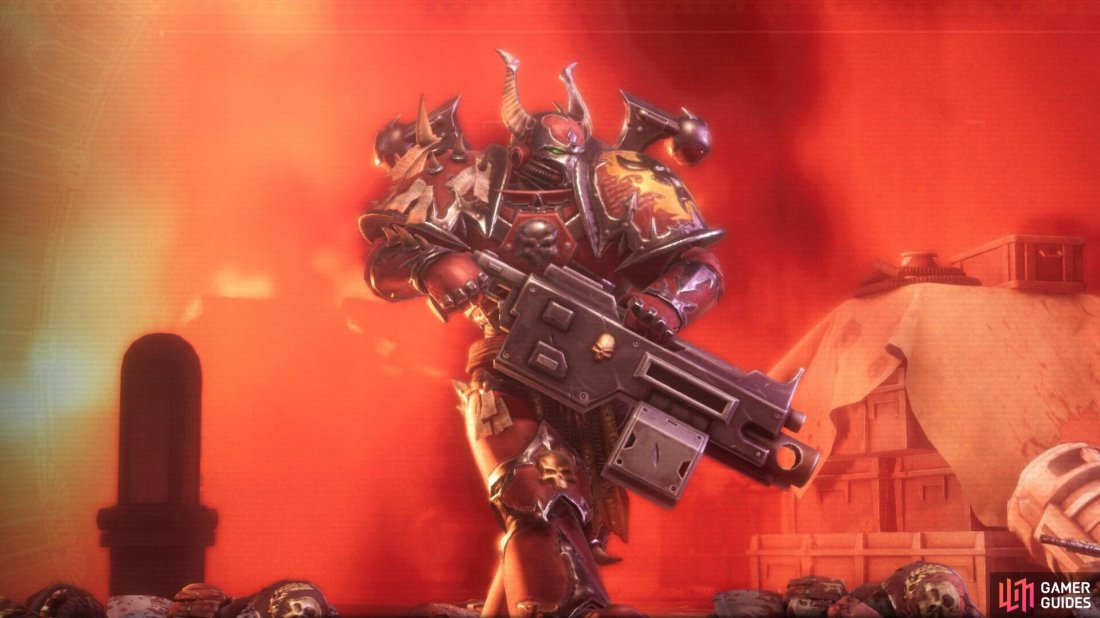
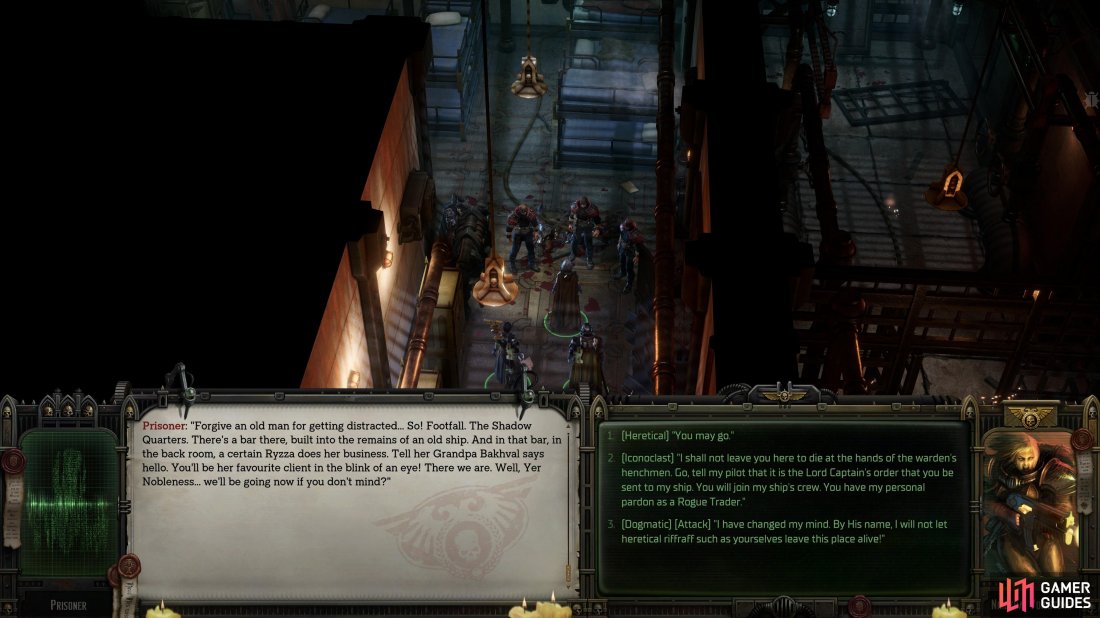
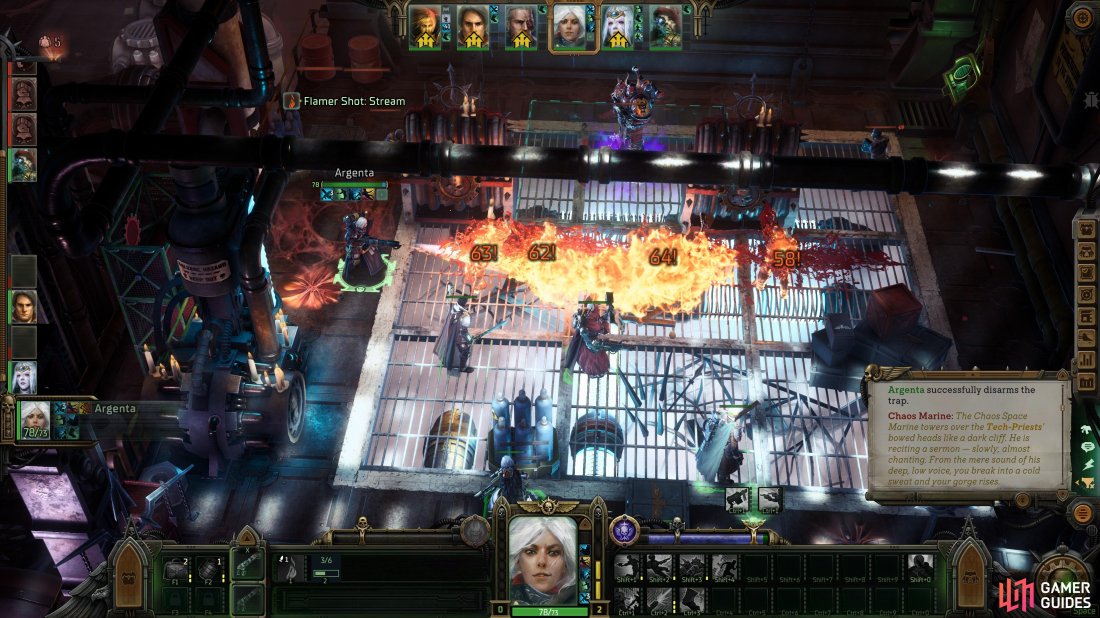
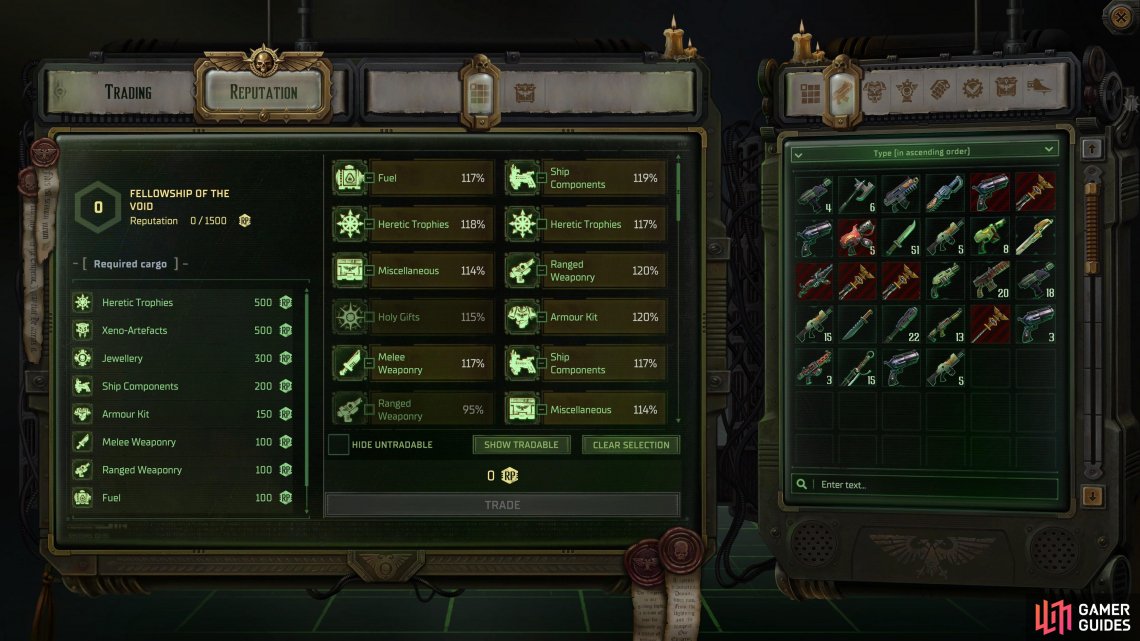

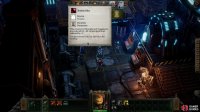


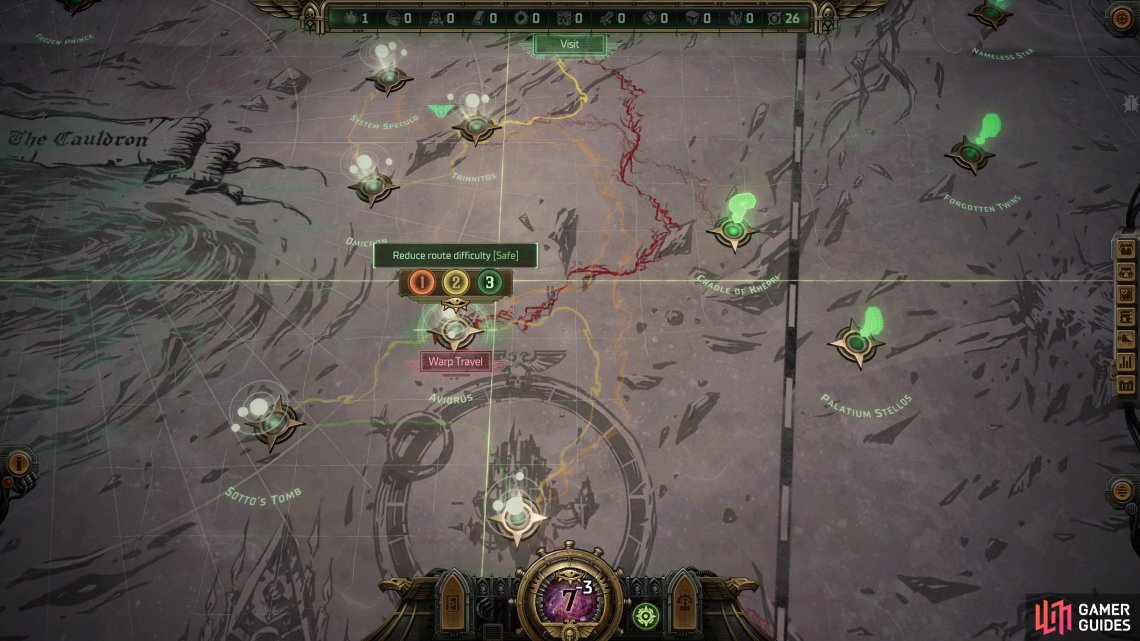

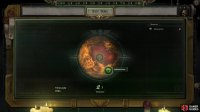


 Sign up
Sign up
No Comments